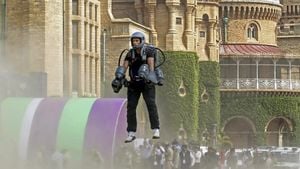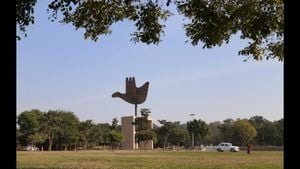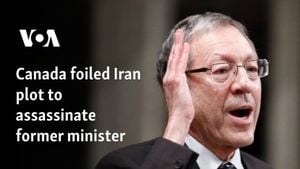About a dozen neo-Nazi demonstrators marched through the Short North neighborhood of Columbus, Ohio, on Saturday, waving flags adorned with swastikas and chanting inflammatory slogans. Social media quickly lit up with outrage as videos of the procession circulated, documenting the unsettling scene.
City officials, community leaders, and citizens alike were taken aback by the march, which sparked immediate condemnation from various political figures, including Ohio Governor Mike DeWine and Columbus Mayor Andrew Ginther. Speaking out against what he called a "cowardly display," Mayor Ginther asserted, "The Columbus community stands squarely against hatred and bigotry. We will not allow any of our neighbors to be intimidated, threatened, or harmed because of who they are, how they worship, or whom they love."
Governor DeWine echoed those sentiments, explaining, “There is no place in this State for hate, bigotry, antisemitism or violence, and we must denounce it wherever we see it.” His statement arrived on the heels of the White House’s assertion, labeling the actions of the neo-Nazis as the "hateful poison of Nazism." White House spokesperson Andrew Bates emphasized, "Hate directed against any of us is a threat to every single one of us."
Columbus City Attorney Zach Klein spoke passionately about the incident, describing the feelings of disgust and anger shared by many within the community. “When I first heard about it and got contacted, I was not only disgusted, but I was madder than hell, because this is not what we are as a community,” Klein said. He insisted on the need for various community leaders—from faith leaders to educators—to actively combat such ideologies. “We need faith leaders… We need teachers… We need parents to do it at home with their kids. This is an all-hands-on-deck approach because we are seeing this rise in this Nazi ideology,” he proclaimed.
Despite the pronouncements from leaders, the Columbus Division of Police, who received multiple 911 calls about the march, noted the challenge of making arrests due to the First Amendment protections over such demonstrations. Police Chief Elaine Bryant stated, "The Constitution protects First Amendment activity, no matter how hateful," but assured residents, "No one in our community should experience intimidation or harassment. We will continue to strive to make Columbus a city where all residents feel welcome and safe.”
The incident has raised broader concerns about the presence of hate groups within Ohio. The Southern Poverty Law Center has reported the state holds many hate organizations, including five neo-Nazi groups. Recently, Central Ohio has witnessed several such incidents, including earlier this summer when chapters of neo-Nazis were active and had organized protests against events supporting minority groups.
Notably, video evidence has emerged depicting participants of the march using pepper spray during confrontations with counter-protesters, leading to growing scrutiny on law enforcement’s handling of hate-based incidents. Despite some being detained at the scene, police indicated no formal charges were made, igniting discussions around equal enforcement and the treatment of protest groups across racial lines. This feeling of inequity has been compounded by the police's aggressive response to past Black Lives Matter protests within the same city, raising poignant questions among residents about systemic discrepancies.
On Sunday evening, approximately 100 community members gathered to stand against hate, uniting to demonstrate solidarity and resilience. Amid their display of resistance, city leaders voiced gratitude for the supportive turnout, highlighting the grit of Columbus against forces of hate.
While civic leaders strive for inclusivity, grassroots organizations such as the Jewish Community Relations Council have mobilized efforts to create dialogue and education around hate and violence. Brian Winston of the 100 Black Men of Central Ohio led subsequent counter-demonstrations, asserting the community's resolve to oppose any ventures targeting marginalized groups.
The recent resurgence of such hateful displays not only troubles city officials but also calls upon the broader American society to confront the painful resurgence of white supremacist ideologies across the nation. Activists and leaders alike have emphasized the need for vigilance, reminding the public of the importance of advocacy and awareness to counteract hate and protect the community's diversity.
One local expert on hate groups pointed out the incidents reflected broader societal issues, noting, "White supremacy doesn’t just live here, it thrives here," highlighting the need for collective involvement to address these deeply rooted problems instead of relegated to mere statements from officials.
The neo-Nazi march has illuminated stark realities of intolerance existing not only within Columbus but also within other pockets of America, necessitating urgent reflection and concerted action to safeguard civil rights and inclusive communities.
Moving forward, as investigations continue and city officials plan their next steps, community members remain cautiously optimistic. All eyes remain on Columbus—a city caught at the crossroads of rumbling past and hopeful future.



